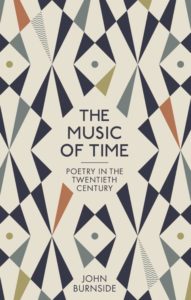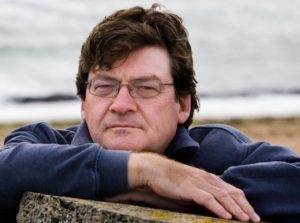“As music-making is a way of making sense of noise, of giving noise order,” writes John Burnside in The Music of Time: Poetry in the Twentieth Century, “so poetry is a way of ordering experience, of giving a meaningful order to lived time.” And that’s precisely what the author proceeds to do. Instead of writing what readers might expect—a survey of twentieth century poetry—Burnside considers some of the great poetry of the last century and how it shaped and gave meaning to his own life.
Burnside, a poet, novelist, and essayist, is considered one of the greatest living literary critics. Like most of us, he has had a diverse life that needs some meaningful ordering. He studied English and European languages at the Cambridgeshire College of Arts and Technology, then worked as a computer analyst and software engineer for many years. He began to publish poetry in the 1980s and is now the author of some 16 poetry collections. He’s also a novelist, his most recent work being Havergey (2017), the story of man who experiments with time travel and ends up in a future Scotland—having missed the intervening plagues (a bit like skipping 2020 and finding yourself in a post-coronavirus world).

The recent centenary of World War I included a resurgence of interest in the World War I poets. But, as Burnside points out, contemporary readers largely misunderstand their perspectives. We tend to see their poetry as expressing a growing disillusionment and pacifism. Burnside (correctly) notes their largely patriotic perspectives. He himself prefers one of the poets, Siegfried Sassoon, the one who expressed a very vocal pacifism.
Burnside navigates toward these exceptions, poets like Sassoon and Albrecht Haushofer, a poet rooted in Bavarian geography and one who was executed by Nazi Germany for knowing too many people involved in the plot to assassinate Hitler. Burnside finds himself fascinated by these stories, people who zig when the rest of the world zags.
He examines similar poets for an array of countries. Rafael Alberti fought in the Spanish Civil War. Ezra Pound was a wonderful poet and champion of T.S. Eliot who rather disgraced himself by wholeheartedly supporting Mussolini. Robert Frost was unexpectedly asked to write and read a poem at John F. Kennedy’s inauguration, harnessing poetry to power. It was an adulation mirrored by Lawrence Ferlinghetti’s anger aimed at George W. Bush.

John Burnside
And he tells personal stories of his life, from youth and middle age to now, stories that fold into stories of the poets he admires and the poetry he loves. Woven together, the insights in poetry and the personal stories result in a literary memoir that is surprisingly light on self-absorption. Many of the stories relate to the music he grew up with, at an age when lyrics seem to burn into our brains.
In addition to his 16 poetry collections, Burnside has published 11 novels and 6 nonfiction works. He was also a writer for the TV series Dice. He won both the T.S. Eliot Prize and the Forward Poetry Prize for Black Cat Bone (2011), one of only three poets who’ve won both prizes for the same collection. He has won numerous other awards for poetry and fiction. He is also a columnist on nature for New Statesman. A native of Scotland, he teaches at the University of St. Andrews.
The Music of Time is part poetry survey, part memoir, and part recognition of the role poetry can play in one’s life. It’s a story that transcends the life of one person, embracing all of us who know the sense of order and meaning that poetry can bring. Along the way, we learn of poets great and almost unknown and are thankful for what they’ve done.
Photo by mstkeast, Creative Commons, via Flickr. Post by Glynn Young.
__________________________

“I require all our incoming poetry students—in the MFA I direct—to buy and read this book.”
—Jeanetta Calhoun Mish
- “Your Accent! You Can’t Be from New Orleans!” - October 9, 2025
- Poets and Poems: Donna Vorreyer and “Unrivered” - October 7, 2025
- Poet Sidney Lanier and the Lost Cause - October 2, 2025

Megan Willome says
This sounds like something I would enjoy. The poems I read are always inseparable from my life at that moment.
As the Tweetspeak community reads John O’Donohue, I don’t think I would have liked this collection at any other time, but right now it is speaking to me and encouraging poems I did not suspect were lurking.